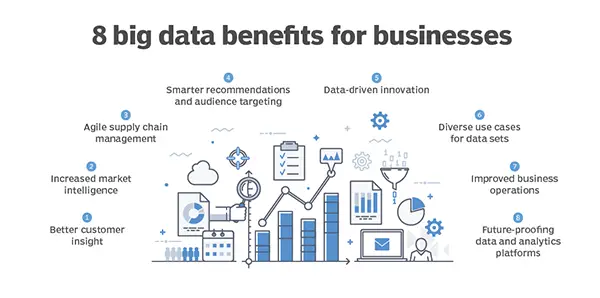The Impact of Big Data on Enterprise Content Management Systems

The business world is pretty much all digital today but it’s not all a simple matter.
With everything accessible in digital format, companies need to manage a huge amount of data.
This is why they need a solution that can help them manage and extract value from this sea of information and data. Also, learn about Tool in Data Management with this guide.
Enterprise Content Management Systems (ECMS) is a great solution that can help these companies simplify, organize, and manage their data more effectively.
In this blog, we will see how big data can help ECMS adapt to the bottlenecks and opportunities that this flood of data can bring.
The Big Data Landscape
The whole world of big data can basically be summarized into three Vs.
Volume, Velocity, and Variety.
These Vs pretty much represent a huge amount of data that can be pretty hard to manage by using any normal data management tool.
This data can come from any source, and this includes sources like social media, sensors, transactional systems, etc.
All this data pretty much justifies why ECMs are so important for businesses.
DID YOU KNOW?
The average company analyzes 37-40% of its data, this can go as high as 97% if the company uses ECMS systems to analyze their data.
Integration of Big Data and ECMS
Efficient Data Storage and Retrieval
One of the biggest issues that a company faces when dealing with big data is the skyscraper amount of data that it contains.
ECMS can give companies a pretty efficient storage solution for this.
By making sure that this huge amount of data is organized and easily retrievable.
It can be anything, a document, a multimedia file, or diverse data formats. ECMS ensures a structured repository that allows for seamless and easy access.
Scalability for Growing Data Volumes
You know, big data can be pretty scalable and ECMS can also adapt to this scalability.
This means as the company grows, its ECMS can also scale with it to handle a bigger data load without any loss of performance.
This means that the ECMS will still be reliable even if the company is flooded with more data than it is currently managing.
Streamlined Processing and Analysis
Besides, big data is not all about storing data. It also helps us get meaningful information out of it.
With ECMS platforms, we can integrate pretty advanced processing and analytical tools that can allow businesses to get valuable information from their content.
This integration enhances decision-making processes, enabling organizations to make informed choices based on real-time data analysis.
Enhanced Collaboration and Knowledge Sharing
- Real-time Collaboration in a Big Data World: Real-time collaboration is also important for companies when we look at the speed at which data is generated.
ECMS allows this by giving the companies a centralized platform where teams can seamlessly access, share, and collaborate on big data-driven insights.
With this, we can make sure that the decision-makers of different departments in the company are working with the latest information.
- Knowledge Sharing Across the Organization: Big data can sometimes also have some hidden gems of knowledge that are very important for business growth.
ECMS allows this knowledge to be shared by creating an environment where insights, reports, and findings can be documented and accessed across the organization.
- Interactive Data Visualizations: To enhance collaboration, modern ECMS platforms use interactive data visualizations.
This visual representation can make big data’s complex information simple and easy to understand.
This can also create a sense of cooperation by giving the teams a clear and intuitive way to interpret and discuss data findings.
Challenges and Solutions in the Big Data-ECMS Integration
- Data Security and Compliance Challenges: Big Data introduces data security and compliance concerns.
ECMS platforms, however, embed strong security features, including access controls, encryption, and audit trails, to protect sensitive information.
Compliance protocols can also be added to make sure that organizations meet regulatory requirements in the big data landscape. - Data Variety and Unstructured Content: Well, big data is pretty much filled to the brim with all kinds of structured and unstructured content.
ECMS can help take care of this issue by offering companies a solution for managing various data types.
Be it text, images, videos, or documents, ECMS systems can give them the necessary tools for managing and pulling value from this myriad of data formats.
- Dynamic Scalability and Resource Management: As Big Data volumes fluctuate, organizations face challenges in dynamically scaling their ECMS infrastructure to meet changing demands.
Future-ready ECMS platforms are addressing this by adopting cloud-native architectures and advanced resource management tools.
These systems can automatically scale the resources based on the need.
This means that it will give the best performance when there is a lot of data to be managed and use the resources more scarcely and efficiently when there is less activity to be done.
Future Trends: AI and Machine Learning in Big Data Management
If we look toward the future, we can see that the evolution of enterprise content management systems (ECMS) is deeply entangled with the integration of artificial intelligence (AI) and machine learning (ML).
These technologies are set to revolutionize big data management within ECMS platforms, paving the way for more intelligent, automated, and predictive capabilities.
- Automated Data Categorization: AI and ML algorithms can help a lot in automating the categorization process.
This can include text, images, videos, and other content formats.
Automated categorization also improves search capabilities. This allows users to pull relevant information more efficiently.
- Predictive Analytics for Informed Decision-Making: In the future, ECMS can also use the predictive analysis capabilities that AI and ML can offer.
This gives companies the ability to make bold decisions, optimize content strategies, and stay ahead of evolving business and market dynamics.

Conclusion: Navigating the Future with ECMS in the Big Data Era
We have seen just how enterprise content management systems can help companies when they are faced with floods of information from big data.
These systems give companies a structured framework for handling huge datasets and encourage collaboration, knowledge sharing, and efficient data analysis.
As big data continues to evolve, so will the role of ECMS, with the integration of advanced technologies making sure that organizations not only survive but thrive in the data-driven landscape of the future.















